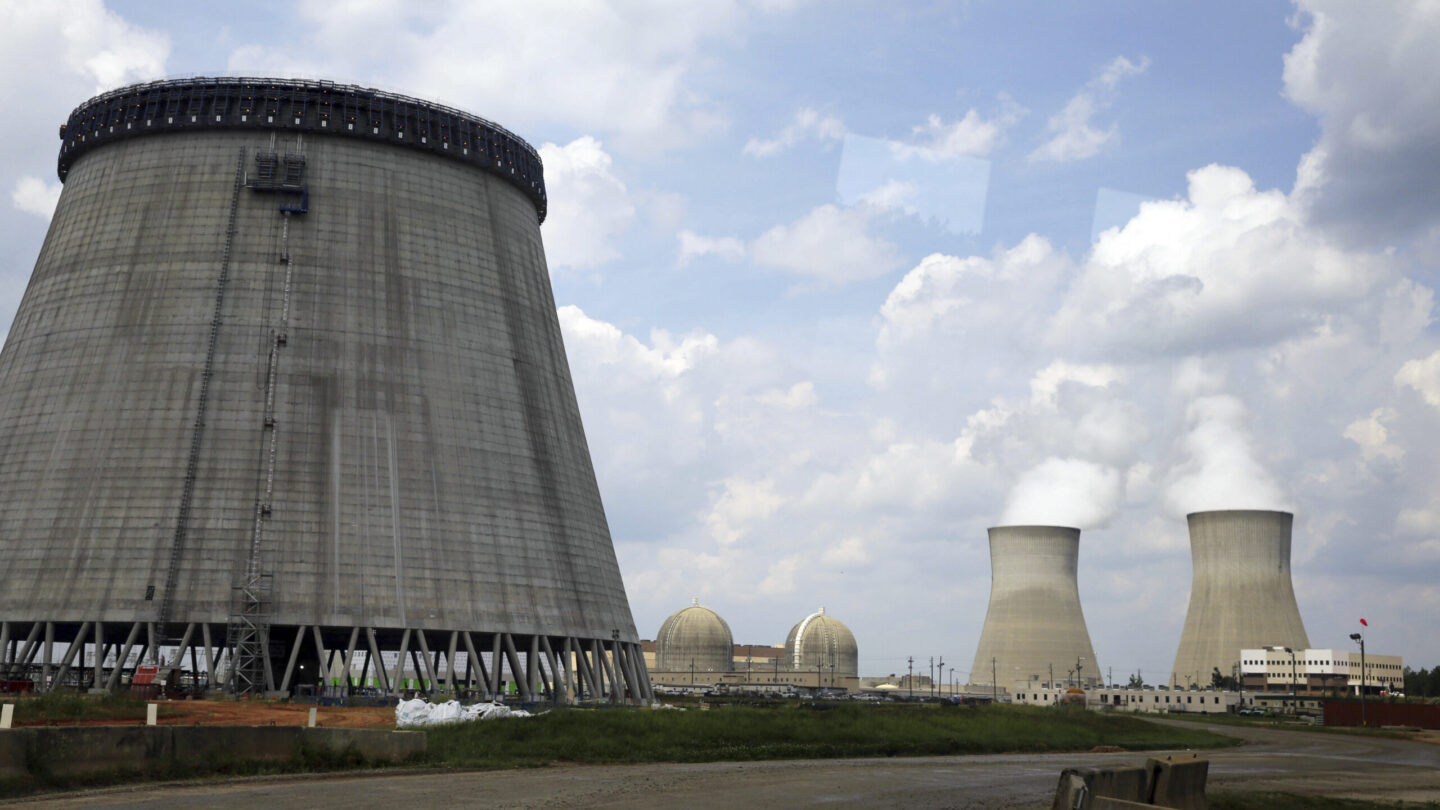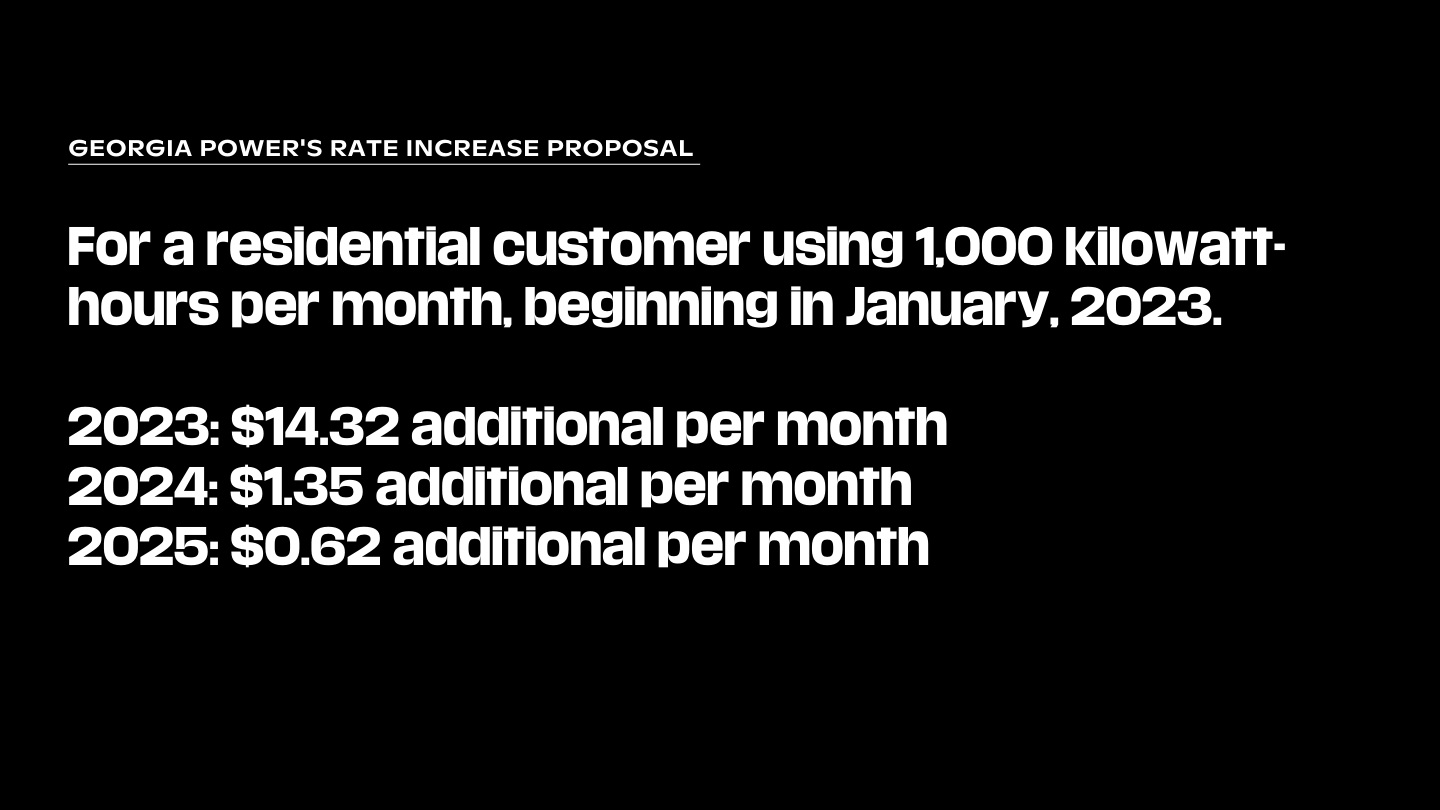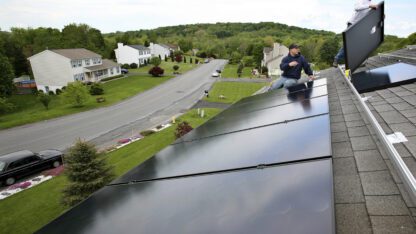Hearings on Georgia Power rate increase begin Tuesday

John Bazemore / Associated Press
Georgia Power wants to raise customers’ bills over the next three years, starting with a jump in January that would add up to about $14 a month for a typical residential customer, according to the company.
Hearings on the rate request begin Tuesday at the Georgia Public Service Commission.
The proceeding could also have an effect on the immediate future of rooftop solar in the state.
Over the next three years, customer rates would go up by close to 12% according to Georgia Power. While the biggest change would be next year, there would be additional increases in 2024 and 2025 if Georgia Power’s rate case plan is approved by regulators.
Chris Womack, president and CEO of Georgia Power, said he recognizes that people are already dealing with high energy prices and inflation.
“We know we’re in an interesting period,” he said. “But we think we’ve got to continue to make investments in our infrastructure and our grid to meet the needs of our state going forward.”
The company says it needs the money to strengthen its grid, close coal plants, clean up coal ash and invest in renewable energy. The money would also go towards increasing profits.

It’s not the only potential addition to people’s Georgia Power bills next year.
As the new nuclear power reactors at Plant Vogtle come online, Georgia Power customers will also begin paying for their construction costs. The project, which is the only commercial nuclear power construction in the country, is years behind schedule and the budget has grown to around $30 billion. Customers have already been paying for financing costs on their monthly bills.
Unit 3, the first of the new reactors that will be completed, is now expected to come online next year.
Georgia Power could also make another request next year to cover costs of coal and natural gas, which would also drive bills higher.
“These additional costs are a real burden for so many Georgians,” said Liz Coyle, executive director of the consumer advocacy group Georgia Watch.
Coyle said Georgians already have a relatively high energy burden, which is the proportion of income that households spend on energy needs.
“We hear from people almost every day who are struggling to pay their power bills,” Coyle said. “I don’t know how they’re going to afford the increases that are likely ahead in 2023 and beyond.”
Mahogany Bowers, who founded Blessings in a Bookbag and works with low income families in Savannah, said she knows people who avoid running the air conditioner, even when it’s dangerously hot, or who end up having to choose between paying energy bills and other essentials, like medicine.
“If you get an AC unit, whether it be a window unit and or it be central air and heat throughout the house … your electricity bill is through the roof,” she said.
Rooftop solar costs
The future of a program that makes rooftop solar power more cost-effective for homeowners might also come up during the rate case.
Georgia Power had piloted a program to allow some people with rooftop solar panels to use a billing mechanism called net metering. That lets customers with solar panels sell the power they generate back onto the grid for the same rate they pay for energy from the grid. Without net metering, Georgia Power pays only a fraction of that rate for power from rooftop systems.
That program maxed out at 5,000 customers, but solar industry supporters and environmental groups hope to see it expand.
Georgia Power has argued that net metering shifts costs onto people who don’t have solar panels.
Thatcher Young, vice president of business development at Georgia-based commercial solar installer Velo Solar, disagrees.
“The reality, what the company doesn’t want to talk about, is what they’re seeing is the potential for revenue erosion,” he said. “It’s not a cost shift. But they would make less money.”
Georgia Power is expected to bring data from its pilot project into the rate case. Public Service Commissioner Tim Echols, who’s led the charge on net metering in the past, said he hopes the data will show other commissioners that net metering is worth it.
“Especially in a time when coal plants are closing, and more electric vehicles are coming, we do need more reliable power,” he said. “And by spreading out that power throughout these neighborhoods to tens of thousands of small solar arrays, I think you do make the grid more reliable.”
But Echols said he’s “not that optimistic” the Commission will expand net metering in this rate case.
The Public Service Commission will hold hearings on the rate case on Sept. 27, 28 and 29 and in November. They will include expert testimony and questioning by Georgia Power and PSC staff, as well as from intervenors ranging from local governments, to environmental groups, to Kroger to the Department of Defense.
People are allowed to comment in person at the beginning of the hearing days and in writing, though the public isn’t allowed to stay in the hearing room after the comment time. The hearings do stream online.
The commissioners are scheduled to vote on their decision in late December.








